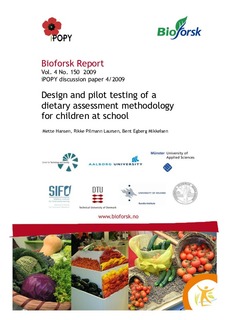| dc.description.abstract | Background: Nutrition‟s impact on an individual‟s health and sustainable consumption of food are issues that have long been on both the public and political agenda but are often viewed as two separate debates. This is surprising since many innovation projects in food service systems are concerned with both healthy eating and sustainable consumption (organic food). The relationship between them forms the background in this study. Evidence has shown that caterers serving organic food tend to also serve healthier meals than their non-organic counterparts but, so far, no studies have been carried out in school food environments.
Aim: The aim of this report was to investigate and develop appropriate methods for studying the link between healthy eating practices and organic food procurement policies using Danish public elementary schools as a setting.
Methods: Based on relevant scientific literature, the Danish Dietary Recommendations, and inspired by other successful studies, a self-administered questionnaire investigating children‟s eating habits was designed. After testing by an Expert Evaluation Panel and Think Aloud Interviews adjustments were integrated.
Conclusion: If special attention is given to literacy skills and cognitive development, children in Danish 6th grade classes can be used as respondents in studies of the relation between food procurement policies and eating practice. The study suggests that a Cross-Sectional design is a satisfactory method to investigate the association between organic procurement policies and children‟s eating habits. A variation of a 24-hour Recall study, a Food Frequency Questionnaire and a method developed during the reported study to identify children‟s knowledge of fruit and vegetables may be combined to cover children‟s overall eating habits. The study suggests that representative 6th grade classes at schools with organic food policies can be selected by cluster sampling and matched with corresponding classes at schools without organic food policies, after which the results could be compared. | nb_NO |
